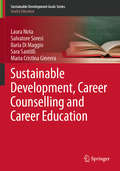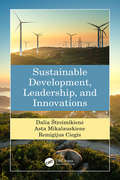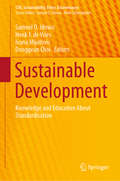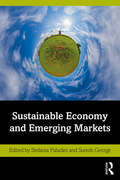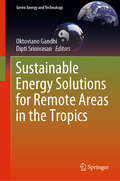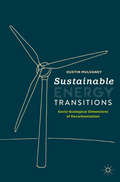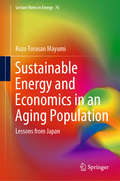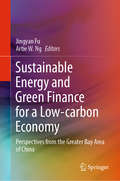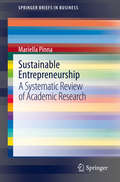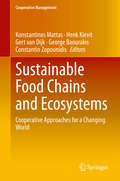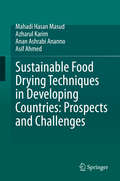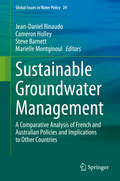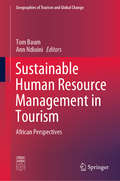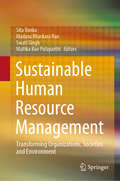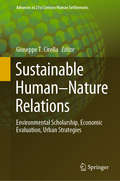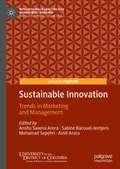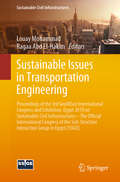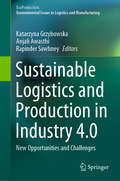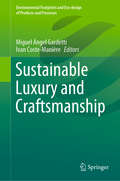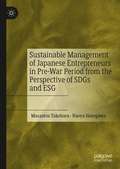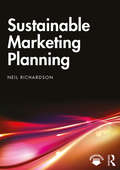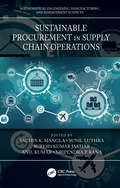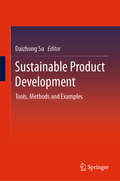- Table View
- List View
Sustainable Development, Career Counselling and Career Education (Sustainable Development Goals Series)
by Laura Nota Salvatore Soresi Ilaria Di Maggio Sara Santilli Maria Cristina GinevraThis book is based on the Life Design paradigm and discusses the efforts made to overcome the matching paradigm between individuals and their work contexts, in order to guarantee the adoption of an active role for future career planning. Starting from the evolution of career counselling and vocational guidance in the 20th century and then following the more updated reflections in the Life Design paradigm, this book discusses research results from the Larios Laboratory (Padova, Italy) in collaboration with numerous international colleagues and institutions. These results show that career counselling and vocational designing can not only help people to plan their future in agentive ways, but also to help them getting out of the ‘mists of the present’ and to project themselves into a future that is yet to be created. This future is aligned by the world of research and international institutions, such as the UN and WHO, and follows the 2030 Agenda for Sustainable Development, with particular attention to Sustainable Development Goals 4, 8 and 12. This book reveals how trajectories can be created from one’s own mission, realized with the help of others and newly acquired strengths. It shows how career counselling and vocational designing can help people to build their own future from an inclusive and sustainable perspective, based on social justice, and to help build a better future for all.
Sustainable Development, Leadership, and Innovations
by Dalia Streimikiene Asta Mikalauskiene Remigijus CiegisThis book deals with the main challenges of sustainable development and the role of sustainable business and corporate social responsibility in implementing these challenges through sustainable leadership and innovations. It includes the economic, social, and environmental dimensions of sustainability and emphasizes the importance of achieving a socio-environmental balance in society. The theoretical frameworks and insights from sustainable development implementations on macro and micro levels, as well as the practical examples and case studies provided to introduce the concept of sustainable leadership and its impact on sustainable business development, are a scientific novelty in the field of sustainability. The book is comprised of six interconnected chapters that sequentially reveal the principal provisions of sustainable development, corporate social responsibility, and sustainable leadership, together with their correlations. Features: • Provides cutting-edge examples and case studies of sustainable leadership, viewed as the most significant means for the creation of sustainable organizational culture • Includes case studies on the economic, social, and environmental dimensions of sustainability • Addresses scientific aspects of sustainable development and its challenges • Discusses issues of sustainable development at different scales, ranging from macro to mirco levels • Provides policy implications for sustainable business development The theoretical framework and practical case studies presented in Sustainable Development, Leadership, and Innovations make it an invaluable resource and guide to both the academic and business communities. Business leaders, policy makers, and other professionals, as well as academics and graduate students, will all benefit greatly from this text.
Sustainable Development: Knowledge and Education About Standardisation (CSR, Sustainability, Ethics & Governance)
by Samuel O. Idowu Henk J. de Vries Ivana Mijatovic Donggeun ChoiThis book examines education about standardization in the context of sustainable management. It shows the role of standardization education in the global economy, and in markets, industries and businesses. The book presents knowledge on standardization for sustainable management, describes measures that can be taken to stimulate it, and highlights strategies for teaching and disseminating the concept. Subsequently presenting a number of best practices and case studies, the book seeks to align theory and practice. For researchers, this is the first academic publication that interconnects the concepts of sustainability, standardization and education. For professionals in the area of sustainability it shows that standardization is an essential instrument for enhancing sustainability for which proper education is needed. For standardization professionals the book reveals the links to sustainability and it shows not only the importance of education about standardization but also how this can be organized, and finally, for universities, the book shows that standardization deserves to be included in the curriculum, and it provides guidance and best practice examples about how this can be done.
Sustainable Economy and Emerging Markets
by Stefania Paladini Suresh GeorgeSustainable Economy and Emerging Markets provides a snapshot of the different dimensions of sustainability and analyses how they interact and configure themselves, case by case, in selected emerging economies. The parameters of economic growth in developing economies are explored in the context of systems, climate change, and environmental challenges. With contributions from a range of business academics, economists, and practitioners, this book conveys a picture of the complex nature of the new global business environment, especially the geopolitical dynamics of emerging countries, and breaks down the challenges across geographic fault lines, offering insights into current business practice. By adopting an in-depth case study approach, this edited book offers and discusses examples from several emerging markets and elucidates how these organisations have modelled business based on sustainable development in its various forms. This book will prove valuable reading for students and scholars of international business, international trade, sustainability, and development.
Sustainable Economy and Emerging Markets
by Stefania Paladini, Suresh GeorgeSustainable Economy and Emerging Markets provides a snapshot of the different dimensions of sustainability and analyses how they interact and configure themselves, case by case, in selected emerging economies. The parameters of economic growth in developing economies are explored in the context of systems, climate change, and environmental challenges.With contributions from a range of business academics, economists, and practitioners, this book conveys a picture of the complex nature of the new global business environment, especially the geopolitical dynamics of emerging countries, and breaks down the challenges across geographic fault lines, offering insights into current business practice. By adopting an in-depth case study approach, this edited book offers and discusses examples from several emerging markets and elucidates how these organisations have modelled business based on sustainable development in its various forms. This book will prove valuable reading for students and scholars of international business, international trade, sustainability, and development.
Sustainable Energy Solutions for Remote Areas in the Tropics (Green Energy and Technology)
by Oktoviano Gandhi Dipti SrinivasanThis book covers multifaceted aspects of sustainable energy solutions for remote areas in the tropics, particularly focusing on Southeast Asia. With insights from both the academic world and real-life implementation, readers will gain an overview of the range of energy problems currently facing the remote tropics, and what potential solutions are available. The book provides a detailed overview of various energy needs in the Southeast Asian tropics, a region where a significant portion of the population still lives without access to electricity. It not only addresses technical solutions to the energy problems but also tackles the social and wider implications, offering readers a more holistic understanding of the potential held by renewable energy. The chapters are structured to present first an overview of the problem at hand, and then a description of the technologies that could potentially solve it. Applications of the technologies; business models that are now available or being developed; the impact of the technologies; and future, more sustainable solutions are all discussed. Given its in-depth analysis, the book will be of interest to energy professionals in the tropics, energy policymakers, and students studying sustainable energy.
Sustainable Energy Transitions: Socio-Ecological Dimensions of Decarbonization
by Dustin MulvaneyThis textbook introduces the key concepts that underpin sustainable energy transitions. Starting with the basic biophysical principles, current sources and environmental consequences of existing energy resource use, the book takes readers through the key questions and topics needed to understand, prescribe, and advocate just and sustainable energy solutions. The interdisciplinary nature of the book aims to build bridges across the social and natural sciences and humanities, bringing together perspectives, ideas and concepts from engineering, economics, and life cycle assessment to sociology, political science, anthropology, policy studies, the humanities, arts, and some interdisciplinary thinkers that defy categories. This accessible approach fills the gap for a textbook that integrates sustainability science and engineering studies with strong empirical social science and it will be a useful tool to anyone interested in the socio-ecological dimensions of energy system transitions.
Sustainable Energy and Economics in an Aging Population: Lessons from Japan (Lecture Notes in Energy #76)
by Kozo Torasan MayumiThis book discusses current challenges in Japan, focusing on the nation’s rapidly aging population and low birth rate, along with persistent public bond issues with heavy interest payments, the potential collapse of social security systems, and income inequality, as well as the global picture. In turn, it examines the accessibility of global fossil fuels and feasibility of large-scale solar energy use. A new theory of money, interest, and capital is put forward, together with a proposal for an alternative system of international monetary cooperation, to promote a more sustainable and equitable world. Specific topics discussed include • the inverted population pyramid, due to the dramatic change in human life spans and declining birth rates; • the rapidly shrinking workforce, aging population, and declining GDP share sourced from industry; • disproportionate debt expansion due to public bond issues and coping with a persistent budget deficit; • the potential collapse of social security systems combined with income inequality; and • how to mitigate these bio-economic predicaments. Global Energy Sources offers an essential guide for policymakers, economists, researchers, and all those concerned with establishing a sustainable and equitable society from both energy and monetary perspectives. Further, it will be of interest to readers around the world, as the lessons learned from Japan are crucial to other developed societies that may eventually face the same types of challenge.
Sustainable Energy and Green Finance for a Low-carbon Economy: Perspectives from the Greater Bay Area of China (Green Energy And Technology Ser.)
by Jingyan Fu Artie W. NgThe book provides readers with essential insights into key issues in connection with planning, developing and financing sustainable energy projects in China that are relevant for practitioners, investors and developers involved in the emerging sustainable energy sector. It offers readers a deeper understanding of these contemporary issues by drawing on the lessons learned in real-world sustainable energy and green finance development activities in China, which are driven by central planning and policy implementation and complemented by investments and finances from public-private partnerships.
Sustainable Entrepreneurship: A Systematic Review of Academic Research (SpringerBriefs in Business)
by Mariella PinnaThis book examines the current body of knowledge on sustainable entrepreneurship. Using network and content analysis, the author maps the structure of the research field and provides a systematic review. In this regard, network analysis is used to find evidence of thematically related clusters of publications and polarizing differences across the subfields of inquiry. In contrast, content analysis is employed to identify and address emerging gaps in the literature. In particular, after discussing mainstream contributions, the author focuses on pioneering research and predicts possible paths that might challenge researchers in the future. The author contributes to the ongoing debate on the definition and boundaries of the flourishing field of sustainable entrepreneurship, by offering critical insights and possible future development pathways derived from both quantitative and qualitative analyses.
Sustainable Food Chains and Ecosystems: Cooperative Approaches for a Changing World (Cooperative Management)
by Constantin Zopounidis George Baourakis Gert Van Dijk Konstantinos Mattas Henk KievitUnarguably, preserving the ecosystem, securing sustainability and understanding the dynamics of agro-food chains have all become vital policy objectives with several interlinked dimensions. The main objectives of this book are to draw the attention of researchers, policymakers and businesspeople to the relation between agro-food chains and the ecosystem, and to demonstrate the importance of building resilient agro-food chains that take into account climate change and environmental challenges. Agro-food chains as they function today can serve as powerful tools for promoting sustainable forms of agriculture, consumption and production that are embedded in a viable ecosystem. The book addresses a range of environmental, methodological and societal issues from a transaction perspective, while also providing extensive background information on the topic, and outlining future applications and research directions.
Sustainable Food Drying Techniques in Developing Countries: Prospects and Challenges
by Azharul Karim Mahadi Hasan Masud Anan Ashrabi Ananno Asif AhmedThis book presents a comprehensive review of renewable energy-based sustainable drying techniques for developing countries. Aspiring towards a world with zero food waste, the book has provided discussion on sustainable drying techniques in terms of energy efficiency. The socio-economic condition of each developing country is unique; therefore, has specific technological requirements. As such, the book presents discussions on food waste scenario around the world, the socio-economic status of developing countries and their correlation with food. The book gives an overview of the quality aspects of drying, along with the required energy and time to retain these features. Additionally, a method of selecting drying techniques for developing countries, taking the cost and safety factor into consideration, has been discussed extensively Also, the renewable and non-renewable energy resources of low income, lower-middle income, middle income, and high-income developing countries have been analyzed and presented. The book also highlights the available drying techniques that are currently being practiced by the consumers and industries of developing countries. The book recommends ten sustainable drying technologies for the developing countries and describes their working principle. Discussion on potential challenges for sustainable drying technology adoption is also presented. The book presents up-to-date research on sustainable drying techniques and their impact on developing countries to reduce food waste.Food waste is not only a humanitarian concern but also a threat to environmental sustainability. Currently, one-third of all produced food is being wasted, when nearly 805 million people - including children remain undernourished on a daily basis. In an effort to solve this crisis, a number of food preservations techniques are being practiced in food supply chain. Drying is one such preservation technique that prevents microbial proliferation, slows enzymatic reaction and preserves the physio-chemical properties of food. Albeit, drying is an effective means of food preservation; it is also highly energy-intensive. Developing countries do not have sufficient energy and financial resources to adopt conventional (expensive and high energy) drying techniques. As such, this is the first reference work dedicated to discussing the prospects and challenges of sustainable (renewable energy based and inexpensive) drying techniques for developing countries in order to reduce food waste. Sustainable food drying techniques in developing countries: Prospects and Challenges is a singular work in the field of food preservation and affordable drying technology.
Sustainable Groundwater Management: A Comparative Analysis of French and Australian Policies and Implications to Other Countries (Global Issues in Water Policy #24)
by Steve Barnett Jean-Daniel Rinaudo Cameron Holley Marielle MontginoulThis book describes and analyses the diversity of possible approaches and policy pathways to implement sustainable groundwater development, based on a comparative analysis of numerous quantitative management case studies from France and Australia.This unique book brings together water professionals and academics involved for several decades in groundwater policy making, planning or operational management to reflect on their experience with developing and implementing groundwater management policy. The data and analysis presented accordingly makes a significant contribution to the empirical water management literature by providing novel, real world insights unpublished elsewhere. The originality of the contributions also lies in the different disciplinary perspectives (hydrogeology, economics, planning and social sciences in particular) adopted in many chapters. The book offers a unique comparative analysis of France, Australia and experiences in countries such as Chile and the US to identify similarities, but also fundamental differences, which are analysed and presented as alternative policy options – these differences being mainly related to the role of the state, the community and market mechanisms in groundwater management.
Sustainable Human Resource Management in Tourism: African Perspectives (Geographies of Tourism and Global Change)
by Tom Baum Ann NdiuiniThis book addresses the application of sustainable HRM principles within tourism in the specific context of Africa, a neglected area of study. It draws on diverse aspects of HRM, from the micro- (individual) through the meso-level (organisational) to the macro-level (policy, governmental). It also reflects the diverse challenges facing a critical area within emerging African tourism, that of its workforce. The book is substantially research-based and provides a state-of-the-art picture of emergent studies in this area, drawing on case examples from a wide-range of African contexts. As such, it provides a comprehensive resource and starts discussion in an emergent research area.
Sustainable Human Resource Management: Transforming Organizations, Societies and Environment
by Sita Vanka Madasu Bhaskara Rao Swati Singh Mallika Rao PulaparthiThis book provides a multi-stakeholder perspective on sustainable HRM for the policymakers, managers and academics, addressing issues, approaches, research studies/frameworks and emerging patterns relating to the subject. It discusses various aspects of sustainability, such as making HR more responsible for ensuring sustainability focusing on the triple bottom line, characteristics of sustainable HRM, psychological contracts, emotional intelligence, and psychological capital. The book also explores organizational citizenship behavior, employment relations, employee engagement, sustainable leadership, disruptive HR practices, sustaining employee motivation, educational sustainability, sustainable career management, sustainable environment, employer and employee branding, sustainable organizations, organization culture, training for sustainability, sustainable employee performance, business sustainability and sustainable employability. It provides an update on the concept, processes, issues and emerging paradigms from multidimensional and cross-country perspectives to showcase sustainable HR practices, and appeals to the academics, practitioners and policymakers in the area of HRM.
Sustainable Human–Nature Relations: Environmental Scholarship, Economic Evaluation, Urban Strategies (Advances in 21st Century Human Settlements)
by Giuseppe T. CirellaThis book addresses sustainability thinking and the bigger picture, by taking into consideration how and from where contemporary schools of thought emerged approximately a quarter-century ago. Evidence from the literature illustrates a number of key concepts and techniques that have been tested and continue to be tested, within various multi-disciplinary fields, on societal functionality. Research into sustainable societies needs to be sound, ethical, and creative. A cross-sectoral, interdisciplinary examination of challenges and strategies is used to interlink sustainability thinking and human-nature relations. With an ever-growing number of people now concentrated within urban areas, providing not only environmental quality and livable space, but also security and resilient urban systems, is becoming increasingly important. This urbanization trend has overlapped with environmental degradation, consumption of natural resources, habitat loss, and overall ecosystem change. Consequently, the goal is for cleaner, safer societies – with higher standards of living – to excel in support of current and future generational communities. The book tackles these challenges by integrating environmental scholarship, economic evaluation, and urban strategies under one umbrella of thought. The relational paradigms presented include examples that correlate developed and developing countries, socioeconomics and community development, and governance of knowledge and education. As such, the book argues, furthering of knowhow should be accessible and shared in order to achieve maximum innovation and benefit. Sustainability thinking, after all, is a metric for intrinsic human-nature relations in terms of past performance, present development, and future goals. This book discusses this metric and offers novel approaches to growing societies and what we can do next.
Sustainable Innovation: Trends in Marketing and Management (International Marketing and Management Research)
by Anshu Saxena Arora Sabine Bacouel-Jentjens Mohamad Sepehri Amit AroraIn today’s ever-changing global world, there is a permanent need for anticipating new and evolving customer needs, resource supply constraints, and dynamically changing employee expectations. Sustainable innovation applies to products, services, and technologies as well as new business and organization models. This book provides insights into sustainable innovation trends in various marketing- and management-related fields. Authors critically investigate, amongst others, the sustainability impact of disruptive product design and innovative collaboration solutions within buyer-supplier relationships, along with innovative organizational processes to promote sustainable well-being-productivity synergy in a VUCA world. This volume is a uniquely positioned contribution of interrelated research articles on the sustainability-driven innovation needed for organizational health and future viability.
Sustainable Issues in Transportation Engineering: Proceedings of the 3rd GeoMEast International Congress and Exhibition, Egypt 2019 on Sustainable Civil Infrastructures – The Official International Congress of the Soil-Structure Interaction Group in Egypt (SSIGE) (Sustainable Civil Infrastructures)
by Louay Mohammad Ragaa Abd El-HakimThis book of the GeoMEast 2019 proceedings includes a collection of research and practical papers from an international research and technology activities on recent developments in pavement design, modeling and performance, and effects on infrastructure, green energy, technology, and integration. Sustainability is increasingly a key priority in engineering practices. With the aging transportation infrastructure and renewed emphasis on infrastructure renovation by transportation agencies, innovations are urgently needed to develop materials, designs, and practices to ensure the sustainability of transportation infrastructure.
Sustainable Logistics and Production in Industry 4.0: New Opportunities and Challenges (EcoProduction)
by Katarzyna Grzybowska Anjali Awasthi Rapinder SawhneyThis book proposes essential methods, models, and case studies for Sustainable Logistics and Production in Industry 4.0. In addition to identifying and discussing various challenges and future prospects, it also features numerous case studies and quantitative research from different sectors. The authors (which include academics and managers) present insightful tips on the technical, organizational and social aspects of implementing Sustainable Logistics and Production in Industry 4.0. In today’s world, changes are coming faster and more unpredictably. Production is becoming more automated, computerized and complex. In short, Industry 4.0 is creating many new opportunities, but at the same time several new challenges. This book offers a valuable resource for all academics and practitioners who want to deepen their knowledge of Sustainable Logistics and Production in Industry 4.0.
Sustainable Luxury and Craftsmanship (Environmental Footprints and Eco-design of Products and Processes)
by Ivan Coste-Manière Miguel Ángel GardettiThis book explores the intricate relationship between luxury and craftsmanship, using brand-based case studies and consumer behavior to do so. In addition to revealing how the artification of luxury affects consumer behavior with branding and traditions, it discusses how sustainable luxury could not only offer a vehicle for more respect for the environment and social development, but could also be a metaphor for the cultures, art traditions, and innovations of various nationalities, continuing the legacy of local craftsmanship.
Sustainable Management of Japanese Entrepreneurs in Pre-War Period from the Perspective of SDGs and ESG
by Masaatsu Takehara Naoya HasegawaThis book features 13 Japanese entrepreneurs who made a significant contribution to the development of society from 1868, when modernization in Japan began, to the 1950s, after World War II. They worked on solving social issues at the time through their businesses and succeeded in creating social value by solving social issues and economic value through the development of their businesses. The business philosophies they practiced have been passed on to their successors, and the companies they founded are now providing value to consumers around the world. Those 13 entrepreneurs anticipated the integration of solving social issues into corporate management, which modern companies are expected to realize under the umbrella of the Sustainable Development Goals (SDGs) adopted by United Nations in 2015. Their trajectories provide a wealth of practical knowledge necessary to survive in a changing society and provide many valuable lessons for modern companies and their managers.
Sustainable Marketing Planning
by Neil RichardsonThere are two major parallel challenges facing managers and leaders: first, how to adapt to global changes in markets, competition and supply, and second, how to grow a business while observing recognisably sustainable practices. Companies must now align their values with customers who increasingly seek people-friendly and planet-friendly products and services. Using sustainable marketing techniques to create value ultimately leads to improved customer satisfaction, better professional relationships and increased effectiveness. With marketing planning absent from the current textbook offering, this book provides practical insights, tools and frameworks to help readers produce tactically and strategically appropriate marketing plans. Showing how to embed sustainability in these strategies and reflecting on the historical and current criticisms aimed at marketing, students will be shown how to implement changes while being encouraged to reflect on why they are needed. Full of tools and frameworks to improve comprehension, including chapter-by-chapter learning outcomes, summaries, exercises, applied activities and mini case studies, it bridges the gap between theory and practice effectively and accessibly. Finally, PowerPoint lecture slides and Multiple Choice Questions sections are provided for each chapter as electronic resources. Presenting contemporary themes and challenges at the cutting edge of business research and practice, this book should be core reading for advanced undergraduate and postgraduate students of sustainable marketing, marketing planning and marketing strategy, as well as professionals seeking to improve the competitive advantage of their organisations.
Sustainable Procurement in Supply Chain Operations (Mathematical Engineering, Manufacturing, and Management Sciences)
by Sachin K. Mangla, Sunil Luthra, Suresh Kumar Jakhar, Anil Kumar and Nripendra P. RanaSustainable Procurement is an emerging concept in supply chain and operations management. Manufacturing industries have made improvements in moving from cost-based to quality-based, and customer-focused supply chain management strategies. This is becoming an integrated component in the supply chain system, with players becoming aware of the regulations and needs of the customer. It is imperative for production firms to look at the procurement activity as one of the strategic enablers for sustaining the business in the competitive global environment. This book will provide industries with an understanding of the concepts related to sustainable procurement policies and its implementation. Provides decision and theory development models in sustainable procurement supply chains Includes contributions in all three major analytics: descriptive, predictive, and perspectives in the context of sustainable procurement supply chain Discusses new business models with suppliers and opportunities for co-branding Covers how to develop new tools to measure and allocate the gains from sustainable practices among stakeholders Analyses the science of translating data into meaningful and actionable insights
Sustainable Product Development: Tools, Methods and Examples
by Daizhong SuThis book offers a comprehensive review of sustainability and product design, providing useful information on the relevant regulations and standards for industries to meet increasing market demands for eco-products, while reducing their impact on the environment. The examples and methods presented allow readers to gain insights into sustainable products. The authors also explain how to develop products with sustainability features by applying tools and methods for sustainable design and manufacture. These tools/methods include• Regulations/directives related to sustainable product development• Popular lifecycle analysis software packages• Environmental and social lifecycle impact assessment methods• Lifecycle inventory databases• Eco-point and eco-accounting infrastructure• ICT and traceability technologies for sustainable product development• Sustainable design and manufacture• Integrated approach for sustainable product developmentA description of each sustainability tool is accompanied by easy-to-understand guidelines as well as sustainable product development methods. Five different case studies are also presented to illustrate how to apply the tools and methods into the development of real sustainable products.In view of the increasing pressure on industries to meet the, sometimes conflicting, demands of the market and environment, this book is a valuable resource for engineers and managers in manufacturing companies wishing to update their knowledge of sustainable product development. It is also suitable for researchers and consultants who are involved or interested in sustainable product development, as well as for students studying sustainable development, production, and engineering management.
Sustainable Product Management at Solvay
by George Serafeim Vincent Dessain Mette Fuglsang HjortshoejIn November 2019, Ilham Kadri, CEO of Solvay, a Belgian specialty chemicals and advanced materials group, with annual revenues of more than 10 billion in 2018, announced the group's mid-term strategy, eight months after she took the helm as Solvay's 11th CEO. The case describes what options Solvay had to operate a business transformation to follow a growth path while aiming to be a leading environmental solutions company. Solvay had developed a sustainability tool called Sustainability Product Management to identify promising business applications. How effective was the tool? What business lines should Solvay promote to grow and at the same time be more sustainable?
